Table of Contents
ToggleComprehensive Guide to Hydraulic Oil Seals: Types, Models, Materials, and Market Trends
Hydraulic oil seals are crucial components in sealing hydraulic systems, preventing fluid leakage and ensuring the smooth operation of various industrial, automotive, and construction machinery. With a wide range of applications, hydraulic oil seals are designed to withstand high pressures, extreme temperatures, and diverse working conditions. In this guide, we explore the various types of hydraulic oil seals, popular models, materials, market trends, and pricing considerations.
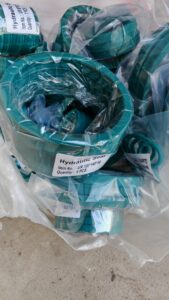
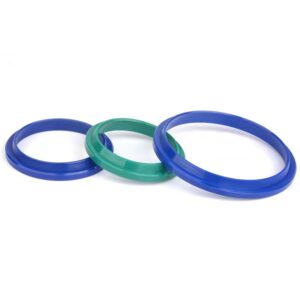
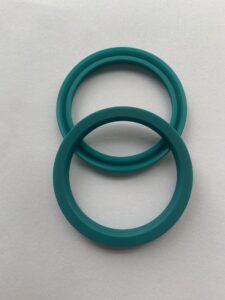
Types of Hydraulic Oil Seals and Popular Models
Hydraulic oil seals come in different types and sizes to meet the specific needs of various applications. Some of the most common types include UN oil seals, UR oil seals, KDAS oil seals, SPGW oil seals, and others. Below are details of the best-selling models within each category:
UN Oil Seals
UN oil seals are widely used in hydraulic applications for their durability and resistance to high pressures and temperatures. Some of the popular models include:
- 14*20*8
- 14*22*4, 14*22*5, 14*22*6, 14*22*8
- 14*24*5, 14*24*8, 14*25*8
- 14*26*5, 14*28*8, 14*28*10
- 15*22*5, 15*22*6, 15*22*8
- 15*23*5
UR Oil Seals
UR oil seals are designed to handle higher pressure and temperature conditions, commonly used in automotive, agricultural, and industrial applications. Best-selling models include:
- 60*72*10, 60*75*10, 60*75*11.5
- 70*82*9, 80*100*12, 80*9*9
- 90*102*9, 90*110*12, 100*120*12
- 100*120*15, 110*130*12
- 120*140*12, 120*140*15
- 140*160*15
JA Oil Seals
JA oil seals are widely used in automotive and industrial machinery, offering high sealing efficiency and low friction. Popular models include:
- 18*28*5/9, 20*30*5/9, 22*32*5/9
- 25*35*5/9, 28*38*5/9, 30*40*6/10
- 32*42*6/10, 35*45*6/10
- 40*50*6/10, 45*55*6/10
- 50*60*6/10
SPGW Oil Seals
SPGW oil seals are known for their high wear resistance and ability to handle harsh working conditions. Popular models include:
- SPGW-50*36*8.5, SPGW-60*46*8.5, SPGW-63*48*10.5
- SPGW-70*55*10.5, SPGW-80*65*10.5
- SPGW-90*75*10.5, SPGW-100*85*12
- SPGW-110*95*12, SPGW-115*10012
- SPGW-120*105*12
Hyva Repair Kits
Hyva repair kits are essential for the maintenance of hydraulic cylinders and lifting equipment. Some popular models include:
- Hyva Kit 214-4, Hyva Kit 191-5, Hyva Kit 191-4
- Hyva Kit 169-4, Hyva Kit 149-3, Hyva Kit 202-6
KDAS Oil Seals
KDAS oil seals are high-performance seals used in demanding hydraulic systems, particularly in the automotive and industrial sectors. Best-selling models include:
- KDAS-40-30-29.1, KDAS-42-28-20.7, KDAS-45-29-31.1
- KDAS-50-34-31.1, KDAS-60-44-31.1
- KDAS-70-50-35.1, KDAS-75-55-35.1
DHS Oil Seals
DHS oil seals are commonly used in applications requiring medium to high sealing efficiency. Popular models include:
- 11.2*19.24.5*/6, 12*204.5/6, 14*22*4.5/6
- 18*26*4.5/6, 20*28*4.5/6, 22*30*4.5/6
- 28*36*4.5/6, 30*38*5/6.5
Materials Used in Hydraulic Oil Seals
The performance and longevity of hydraulic oil seals largely depend on the materials used. Key materials include:
- Nitrile Rubber (NBR): NBR is the most commonly used material for hydraulic oil seals due to its excellent resistance to oil and hydraulic fluids. It performs well in moderate to high-pressure environments and is cost-effective for many industrial applications.
- Polyurethane (PU): Known for its high wear resistance, polyurethane is commonly used in applications where seals are exposed to frequent motion and high abrasion. Polyurethane seals are gaining popularity due to their superior durability, especially in heavy-duty hydraulic systems and equipment with high cycle rates.
- Fluorocarbon Rubber (FKM): Fluorocarbon rubber, or Viton, is used in seals exposed to high temperatures and aggressive fluids, such as oils, fuels, and solvents. These seals are highly resistant to heat, making them ideal for demanding environments like aerospace, automotive, and industrial applications.
- EPDM (Ethylene Propylene Diene Monomer): EPDM seals are highly resistant to water, steam, and certain acids. They are commonly used in hydraulic systems that operate under high-temperature conditions, such as those involving water-based fluids.
- Silicone Rubber (VMQ): Silicone rubber offers excellent resistance to extreme temperatures, both hot and cold. It is used in hydraulic seals when high-temperature resistance is required, but it is not as durable in high-pressure applications as other materials.
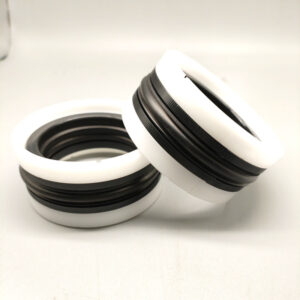
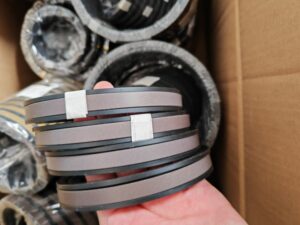
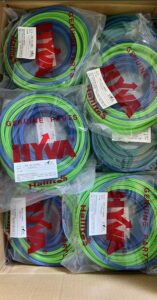
Market Trends and Demand
The hydraulic oil seal market is experiencing steady growth, driven by increasing demand from industries such as construction, automotive, aerospace, and mining. As machinery becomes more advanced and operates under higher pressures and temperatures, the need for high-performance hydraulic oil seals increases. Several factors influencing the market include:
- Demand for High-Performance Seals: Hydraulic systems are operating under more demanding conditions, requiring seals that can handle higher pressures, extreme temperatures, and aggressive fluids. This has led to a rise in the use of advanced materials like polyurethane, FKM, and EPDM.
- Customization and Tailored Solutions: As industries demand more specialized hydraulic systems, the need for customized oil seals is growing. Seals are increasingly tailored to specific applications to improve performance and efficiency.
- Sustainability: There is a growing trend towards eco-friendly sealing solutions. Manufacturers are focusing on developing seals made from sustainable materials that are also recyclable, aligning with the global push towards environmental sustainability.
- Smart Seals and Monitoring: The rise of IoT (Internet of Things) technologies in industrial machinery is driving the demand for smart seals that can integrate with machinery sensors. These smart seals enable predictive maintenance by providing real-time performance data and alerts when seals need to be replaced or serviced.
Pricing Considerations
The price of hydraulic oil seals varies depending on factors such as material, size, and application. On average, hydraulic oil seals range from $5 to $30, with more specialized seals, such as polyurethane or FKM seals, reaching $50 or higher. The price can increase for seals used in high-pressure, high-temperature, or chemical-resistant environments.
Repair kits, such as the Hyva Kits, generally cost between $10 and $50, depending on the complexity and the machinery model they are designed for. Custom seals designed for specific machinery applications might also incur higher costs due to material and production specifications.
Conclusion
Hydraulic oil seals play an indispensable role in maintaining the efficiency and longevity of hydraulic systems. With a wide variety of seal types, materials, and models available, industries can select the best solution based on specific requirements. The market for hydraulic oil seals continues to evolve with advancements in materials, customization, and integration with smart technologies. As industries demand higher performance and environmentally friendly solutions, manufacturers are focusing on innovation and providing seals that can withstand extreme conditions while also contributing to sustainability goals.



Leave A Comment